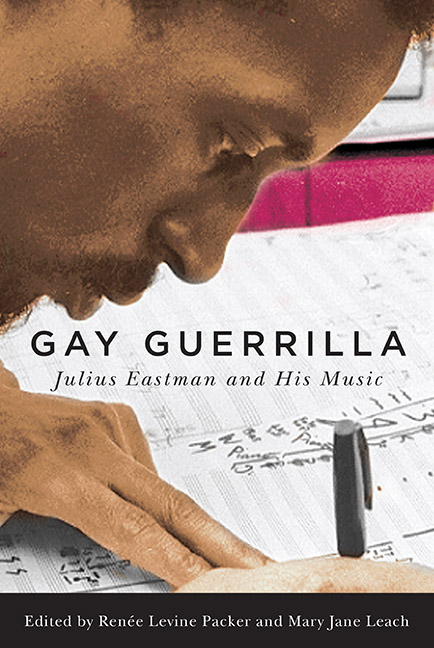Book contents
- Frontmatter
- Contents
- Foreword
- Acknowledgments
- Introduction: Julius Eastman and His Music
- 1 Julius Eastman, A Biography
- 2 Unjust Malaise
- 3 The Julius Eastman Parables
- 4 Julius Eastman and the Conception of “Organic Music”
- 5 Julius Eastman Singing
- 6 An Accidental Musicologist Passes the Torch
- 7 A Flexible Musical Identity: Julius Eastman in New York City, 1976–90
- 8 Evil Nigger: A Piece for Multiple Instruments of the Same Type by Julius Eastman (1979), with Performance Instructions by Joseph Kubera
- 9 A Postminimalist Analysis of Julius Eastman’s Crazy Nigger
- 10 “That Piece Does Not Exist without Julius”: Still Staying on Stay On It
- 11 Connecting the Dots
- 12 Gay Guerrilla: A Minimalist Choralphantasie
- Appendix: Julius Eastman Compositions
- Chronology
- Selected Bibliography
- List of Contributors
- Index
- Eastman Studies in Music
Introduction: Julius Eastman and His Music
Published online by Cambridge University Press: 26 May 2021
- Frontmatter
- Contents
- Foreword
- Acknowledgments
- Introduction: Julius Eastman and His Music
- 1 Julius Eastman, A Biography
- 2 Unjust Malaise
- 3 The Julius Eastman Parables
- 4 Julius Eastman and the Conception of “Organic Music”
- 5 Julius Eastman Singing
- 6 An Accidental Musicologist Passes the Torch
- 7 A Flexible Musical Identity: Julius Eastman in New York City, 1976–90
- 8 Evil Nigger: A Piece for Multiple Instruments of the Same Type by Julius Eastman (1979), with Performance Instructions by Joseph Kubera
- 9 A Postminimalist Analysis of Julius Eastman’s Crazy Nigger
- 10 “That Piece Does Not Exist without Julius”: Still Staying on Stay On It
- 11 Connecting the Dots
- 12 Gay Guerrilla: A Minimalist Choralphantasie
- Appendix: Julius Eastman Compositions
- Chronology
- Selected Bibliography
- List of Contributors
- Index
- Eastman Studies in Music
Summary
“The queen's name is Esss-ther,” growled the distraught voice from the stage. In royal brocaded gown and furred cap, Julius Eastman played-sang-acted the pitiable monarch King George III as stricken and crazy but endlessly human as he roved the stage or sank, spent and muttering on his centered throne… . The underlying agony, the imploring for human understanding, the wrenching effect of the king's straining for reason amid the whirlwinds of his own mind, these were the heights of the Eastman performance.
—John Dwyer, “Eastman's ‘Mad King’: Mighty Work of Theater,” Buffalo Evening News, November 1, 1970.Julius Eastman is regarded as a brilliant composer as well as a magnetic performer. He was a slender man of medium height and graceful mien. If he wasn't being swish, or doing heavy metal with engineer boots and chains, or in his do-rag, you might think he was just another bookish university intellectual in thick-rimmed glasses and a modified Afro. He changed costume and hairstyles periodically in his quest for identity, appearing toward the end of his life in all white toga-like garb, a tacit proclamation of spiritual endeavor.
As with his dress, Eastman's music moved between styles—from traditionally notated scores, to more open graphic renderings. He used improvisation throughout his composing life, sometimes working in minimalist (or what he called “organic music”) and jazz idioms. While a good deal of his work has been lost, the music that remains is increasingly performed and discussed in the United States and abroad, abetted by a growing audience for Unjust Malaise, the 2005 New World Records three-CD set of his music so ably produced by Mary Jane Leach and Paul Tai.
Julius Eastman should have lived a long life. His mother and his maternal grandmother died in their early nineties, his father, at ninety-seven. Instead, Julius was dead just months short of his fiftieth birthday, an architect of his fate, rather than its victim. What were the forces that shaped him? What happened between the years 1968, when Julius premiered his Piano Pieces I–IV in Buffalo, and 1980, when he presented his newest works Evil Nigger, Gay Guerrilla, and Crazy Nigger for performance at Northwestern University?
- Type
- Chapter
- Information
- Gay GuerrillaJulius Eastman and His Music, pp. 1 - 8Publisher: Boydell & BrewerPrint publication year: 2015



